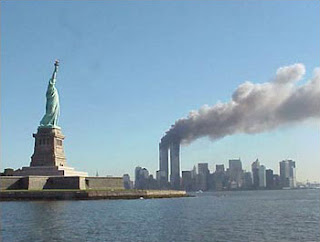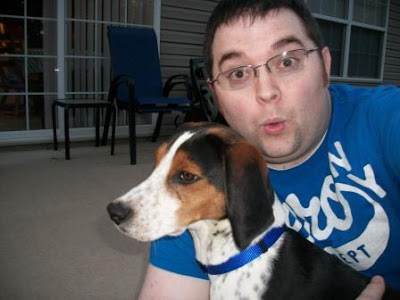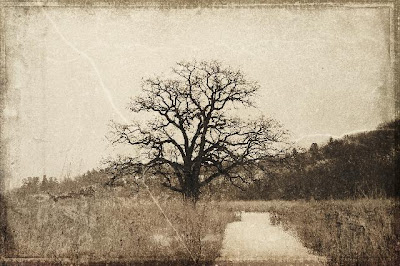That Day
Every year on or around September 11, the national news media make available their archived coverage of the Tuesday morning when four planes were used as weapons to incite fear and terror. I've seen it a number of times: online at ABC News' website, on television as MSNBC replays in real time their coverage from that day, clips on YouTube.
To this day it's indescribable to watch.
There's a feeling in my stomach right now, and it's an unpleasantly familiar one. It's an anxiety, and it's almost as palpable as it was ten years ago watching this unfold on live television. It's there, even though this happened a decade ago. It grows as the clock on the 10-year-old video clicks to 9:02 a.m., because I know what's coming in less than a minute: The world is fewer than 60 seconds away from watching a passenger plane fly into the south tower. On live TV. Maybe that was the perpetrators' aim, but regardless that image is etched forever in millions of minds.
It seems morbidly fitting that at 9:11 a.m., ABC News was showing a replay of the second crash.
I am drawn in by the unscripted off-the-cuff words from the news anchors and reporters and commentators, hearing their innermost thoughts expressed in moments of awe and confusion and angst. I've talked before about the fascination I have as a news man with unfolding events, with "big events" happening at the moment. I wonder what I would have been like as a news man that day.
Coming to this, the tenth anniversary, my thoughts have been in a hundred places. That's probably evident from my writing here, and I apologize.
Several days ago I read the story of a jet fighter pilot who was ordered into the air That Day to patrol for and protect against any other plane-weapons. He talks about his commander asking if he would be capable of shooting down a jet with dozens of innocent people on board in order to protect possibly more people on the ground. He talks about being somewhat insulted at his commitment to duty being called into question.
What would I do? Would I be able to do that?
One harrowing image from That Day, oft lost (at least to me) in the overshadow created by the image of the burning building, is people jumping from dizzying heights to their death, because for them it was preferable to dying in the fireball created by hatred-turned-action.
What would I do? Would my mind make the decision that falling a hundred stories to certain death is a better option?
It angers me that conspiracy theories about That Day persist. In my mind, it belittles what happened and those to whom it happened.
I realize today I never visited the World Trade Center before it fell. I'd been to New York City but going there never once entered my mind. I want to change that. I want to visit the hallowed Ground Zero, if for no reason other than to offer my meager prayer on behalf of everyone touched by that day.
I share some thoughts about that day, first from the leader of the nation that came under terrifying fire That Day, second from LDS then-apostle Thomas S. Monson, and finally from Apostle James E. Faust reconting one of the many accounts of courage and sacrifice from that day.
"Time is passing. Yet, for the United States of America, there will be no forgetting September the 11th. We will remember every rescuer who died in honor. We will remember every family that lives in grief. We will remember the fire and ash, the last phone calls, the funerals of the children." - George W. Bush
"Now, we have inscribed a new memory alongside those others. It's a memory of tragedy and shock, of loss and mourning. But not only of loss and mourning. It's also a memory of bravery and self-sacrifice, and the love that lays down its life for a friend - even a friend whose name it never knew." - George W. Bush
"Amidst the fear, the sorrow, the pain, and the suffering, a mighty miracle occurred - a fusion of faith, even a pattern of prayer - as Americans turned not to diall 911 but rather dropped to their knees and looked heavenward to God for help." - Thomas S. Monson
From James E. Faust, October 2002: "On September 11, 2001, the twin towers of the World Trade Center in New York City were hit by terrorist-controlled airliners that caused both towers to collapse. Thousands of people were killed. Out of this tragedy have come hundreds of stories of courageous, unselfish acts. One very poignant and heroic account is the Washington Post’s story of retired army Colonel Cyril “Rick” Rescorla, who was working as vice president for corporate security of Morgan Stanley Dean Witter.
Rick was a very experienced ex-military combat leader. He was in his office when “the first plane struck the north tower at 8:48 A.M. … He took a call from the 71st floor reporting the fireball in One World Trade Center, and he immediately ordered an evacuation of all 2,700 employees in Building Two,” as well as 1,000 more in Building Five. Using his bullhorn, he moved up the floors, working through a bottleneck on the 44th and going as high as the 72nd, helping to evacuate the people from each floor. One friend who saw Rick reassuring people in the 10th-floor stairwell told him, “Rick, you’ve got to get out, too.”
“As soon as I make sure everyone else is out,” he replied.
“He was not rattled at all. He was putting the lives of his colleagues ahead of his own.” He called headquarters to say he was going back up to search for stragglers.
His wife had watched the United Airlines jet go through his tower. “After a while, her phone rang. It was Rick.
“‘I don’t want you to cry,’ he said. ‘I have to evacuate my people now.’
“She kept sobbing.
“‘If something happens to me, I want you to know that you made my life.’
“The phone went dead.” Rick did not make it out.
“Morgan Stanley lost only six of its 2,700 employees in the south tower on Sept. 11, an isolated miracle amid the carnage. And company officials say Rescorla deserves most of the credit. He drew up the evacuation plan. He hustled his colleagues to safety. And then he apparently went back into the inferno to search for stragglers. He was the last man out of the south tower after the World Trade Center bombing in 1993, and no one seems to doubt that he would’ve been again last month if the skyscraper hadn’t collapsed on him first.”
Amid the great evil and carnage of September 11, 2001, Rick was not looking for what might be in it for him; instead he was unselfishly thinking about others and the danger they were in. Rick Rescorla was the “right man in the right place at the right time.” Rick, “a 62-year-old mountain of a man cooly [sacrificed] his life for others.” 20 As the Savior Himself said, “Greater love hath no man than this, that a man lay down his life for his friends.”
In past years, I tried my hand at poetry to describe my feelings on That Day and the yearly reminders since. This year, I point to others to tell those stories I could never tell.
Take some time and visit national news websites: CNN, ABC News, the New York Times, and the others. Their journalists have put together, in poignant narrative style, stories of the heroes, the real victims, the witnesses of That Day.
That feeling, that anxiety, that pit in the stomach? It always comes this time of year, as I watch what everyone saw That Day. I welcome it, I invite it, I need it.
Because, as though I ever could, I never want to forget That Day.
To this day it's indescribable to watch.
It seems morbidly fitting that at 9:11 a.m., ABC News was showing a replay of the second crash.
I am drawn in by the unscripted off-the-cuff words from the news anchors and reporters and commentators, hearing their innermost thoughts expressed in moments of awe and confusion and angst. I've talked before about the fascination I have as a news man with unfolding events, with "big events" happening at the moment. I wonder what I would have been like as a news man that day.
Coming to this, the tenth anniversary, my thoughts have been in a hundred places. That's probably evident from my writing here, and I apologize.
Several days ago I read the story of a jet fighter pilot who was ordered into the air That Day to patrol for and protect against any other plane-weapons. He talks about his commander asking if he would be capable of shooting down a jet with dozens of innocent people on board in order to protect possibly more people on the ground. He talks about being somewhat insulted at his commitment to duty being called into question.
What would I do? Would I be able to do that?
One harrowing image from That Day, oft lost (at least to me) in the overshadow created by the image of the burning building, is people jumping from dizzying heights to their death, because for them it was preferable to dying in the fireball created by hatred-turned-action.
What would I do? Would my mind make the decision that falling a hundred stories to certain death is a better option?
It angers me that conspiracy theories about That Day persist. In my mind, it belittles what happened and those to whom it happened.
I realize today I never visited the World Trade Center before it fell. I'd been to New York City but going there never once entered my mind. I want to change that. I want to visit the hallowed Ground Zero, if for no reason other than to offer my meager prayer on behalf of everyone touched by that day.
I share some thoughts about that day, first from the leader of the nation that came under terrifying fire That Day, second from LDS then-apostle Thomas S. Monson, and finally from Apostle James E. Faust reconting one of the many accounts of courage and sacrifice from that day.
"Time is passing. Yet, for the United States of America, there will be no forgetting September the 11th. We will remember every rescuer who died in honor. We will remember every family that lives in grief. We will remember the fire and ash, the last phone calls, the funerals of the children." - George W. Bush
"Now, we have inscribed a new memory alongside those others. It's a memory of tragedy and shock, of loss and mourning. But not only of loss and mourning. It's also a memory of bravery and self-sacrifice, and the love that lays down its life for a friend - even a friend whose name it never knew." - George W. Bush
"Amidst the fear, the sorrow, the pain, and the suffering, a mighty miracle occurred - a fusion of faith, even a pattern of prayer - as Americans turned not to diall 911 but rather dropped to their knees and looked heavenward to God for help." - Thomas S. Monson
From James E. Faust, October 2002: "On September 11, 2001, the twin towers of the World Trade Center in New York City were hit by terrorist-controlled airliners that caused both towers to collapse. Thousands of people were killed. Out of this tragedy have come hundreds of stories of courageous, unselfish acts. One very poignant and heroic account is the Washington Post’s story of retired army Colonel Cyril “Rick” Rescorla, who was working as vice president for corporate security of Morgan Stanley Dean Witter.
Rick was a very experienced ex-military combat leader. He was in his office when “the first plane struck the north tower at 8:48 A.M. … He took a call from the 71st floor reporting the fireball in One World Trade Center, and he immediately ordered an evacuation of all 2,700 employees in Building Two,” as well as 1,000 more in Building Five. Using his bullhorn, he moved up the floors, working through a bottleneck on the 44th and going as high as the 72nd, helping to evacuate the people from each floor. One friend who saw Rick reassuring people in the 10th-floor stairwell told him, “Rick, you’ve got to get out, too.”
“As soon as I make sure everyone else is out,” he replied.
“He was not rattled at all. He was putting the lives of his colleagues ahead of his own.” He called headquarters to say he was going back up to search for stragglers.
His wife had watched the United Airlines jet go through his tower. “After a while, her phone rang. It was Rick.
“‘I don’t want you to cry,’ he said. ‘I have to evacuate my people now.’
“She kept sobbing.
“‘If something happens to me, I want you to know that you made my life.’
“The phone went dead.” Rick did not make it out.
“Morgan Stanley lost only six of its 2,700 employees in the south tower on Sept. 11, an isolated miracle amid the carnage. And company officials say Rescorla deserves most of the credit. He drew up the evacuation plan. He hustled his colleagues to safety. And then he apparently went back into the inferno to search for stragglers. He was the last man out of the south tower after the World Trade Center bombing in 1993, and no one seems to doubt that he would’ve been again last month if the skyscraper hadn’t collapsed on him first.”
Amid the great evil and carnage of September 11, 2001, Rick was not looking for what might be in it for him; instead he was unselfishly thinking about others and the danger they were in. Rick Rescorla was the “right man in the right place at the right time.” Rick, “a 62-year-old mountain of a man cooly [sacrificed] his life for others.” 20 As the Savior Himself said, “Greater love hath no man than this, that a man lay down his life for his friends.”
In past years, I tried my hand at poetry to describe my feelings on That Day and the yearly reminders since. This year, I point to others to tell those stories I could never tell.
Take some time and visit national news websites: CNN, ABC News, the New York Times, and the others. Their journalists have put together, in poignant narrative style, stories of the heroes, the real victims, the witnesses of That Day.
That feeling, that anxiety, that pit in the stomach? It always comes this time of year, as I watch what everyone saw That Day. I welcome it, I invite it, I need it.
Because, as though I ever could, I never want to forget That Day.





Comments
Doing the right thing is never easy, especially in the light of fear and uncertainty. But that is what makes these heroes even more heroic. Because they had faith that their decisions *were* the right and the best thing- there was not enough time to question, only enough time to do.
And I love Pres. Monson's reminder that most people, in the midst of such shock, horror, and tragedy, turned not *away* from God, but TO Him.
As Pres. Bush said, we will not forget- we will remember, not just the terrible events of that day, but also the bravery and self-sacrifice that came out of it. The best tribute we can give to honor those sacrifices is the living memorial of our own lives, lived in such a way that we can hold our heads high with honor and respect, confident that we, too, would be ready to give our all if ever asked.
(Thank you for this moving tribute. Love you!)